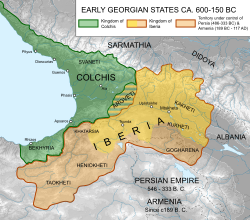Kepler,
I'm a Sephardic Jew, a descendent of the Jews from Seferad (I will use the alternative spelling of "Sepharad" from this point forward so the connection is easier to make.). Recently Spain passed a law of Aliya ("Right of Return") to me, my family, and other Sephardic Jews who were unjustly sent away from our homes and land during the Spanish Inquisition by means of the Alhambra Decree of 1492.
Part of receiving one's citizenship back includes learning your history, and fortunately my family spent over 16 years tracing ours back, beginning in the 1990s. So a lot of this is still very fresh in my mind, though I have to admit I didn't know a lot of it before. I am going to simplify it here, and some of the details differ between sources, but here is the gist.
To begin with, when the First Temple fell, according to Jewish history and tradition, Nebuchadnezzar took the House of David and cared for it in a special place where the descendants of the monarchy could still retain some freedom as well as the dignity afforded royalty. According to tradition and Scripture, the Babylonians had control of the Iberian Peninsula, which is Sepharad or modern Spain and Portugal.
For instance, Obadiah, which was written not too long after the Babylonian invasion of 587 BCE, states near the end of its brief composition:
The exiles of this Israelite army will possess the Canaanite land as far as Zarephath, and the exiles of Jerusalem who are in Sepharad will possess the cities of the Negeb. --Obadiah 20.
Exactly how Nebuchadnezzar transferred these Jews there is still not known, but even according to non-Biblical tradition that is what happened.
The return to Jerusalem from Spain after Babylon fell was a very slow process, especially for the Judeans (members of the Tribe of Judah, including the House of David). The history and tradition get very murky here. When we traced our family roots back we found a myriad of stories, nothing definitive and nothing so conflicting either.
What is known is that the Hasmoneans were never expected to rule, and more than the House of David had an aversion to their exercising kingship over Israel. The only thing we are sure of is that some of the Judeans were back in the Promised Land by this time and some were still in Sepharad. The ascension of the family of Judas Maccabeus to the Jewish throne did, however, stop any further resolve on behalf of the majority of the Judeans still in Spain. And, as we all know, it was from Hasmoneans that (after the introduction of Pompey onto the historical scene) the remnants of this dynasty got mixed with the blood of what eventually became the Herodian monarchy.
Did all Judeans return to the Iberian Peninsula during the time of the Hasmonean rule? No. Again, according to history, tradition (both Jewish and Christian), and even my family's own tradition and lineage, some members of my tribe remained in Judah until the time of the fall of the Second Temple in 70 CE.
When the Second Temple fell, the Jews of the Diaspora divided into the two groups we are most familiar with today, with some going north into Ashkenaz (modern Poland, Austria, and Germany), many of which of the priestly Cohen family, and the rest returning to Spain, mostly Judean, some from the tribe of Benjamin.
The track is hard to follow, but my particular ancestors arrived back in Spain via a trek that took generations, stopping in Rome and Greece along the way. By the time they arrived Islam had risen and taken control of Sepharad--yes, that is how long it took!
During the persecution of the Spanish Inquisition the Catholic authorities believed that the claims of the Jews they were persecuting, that they were of the royal House of David, was just a ploy to get the Christians to have sympathy for them (as this would mean the Christians were persecuting the very family of Jesus of Nazareth). To this day there are many Catholics who continue to claim that the Jews of Iberia were lying about their connection to the famous dynasty, but the history and traditions (though not entirely conclusive) do speak otherwise. And as the Catholic Church is now helping those of Sephardic ancestry to uncover their roots (for some reason the Catholic Church kept very accurate records of who they persecuted during the Spanish Inquisition, how, when, and why), it is becoming increasingly clear that there is a big "gulp" in the throats of many as the claims to Judean and Davidic ancestry are becoming harder and harder to dismiss.
What routes were taken? How did the reach these places? Where is all the evidence? Not all of it is there. We know where we were at during certain points of history, but how we got from point A to B is not always yielding.
